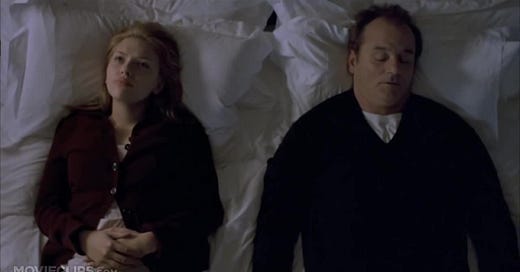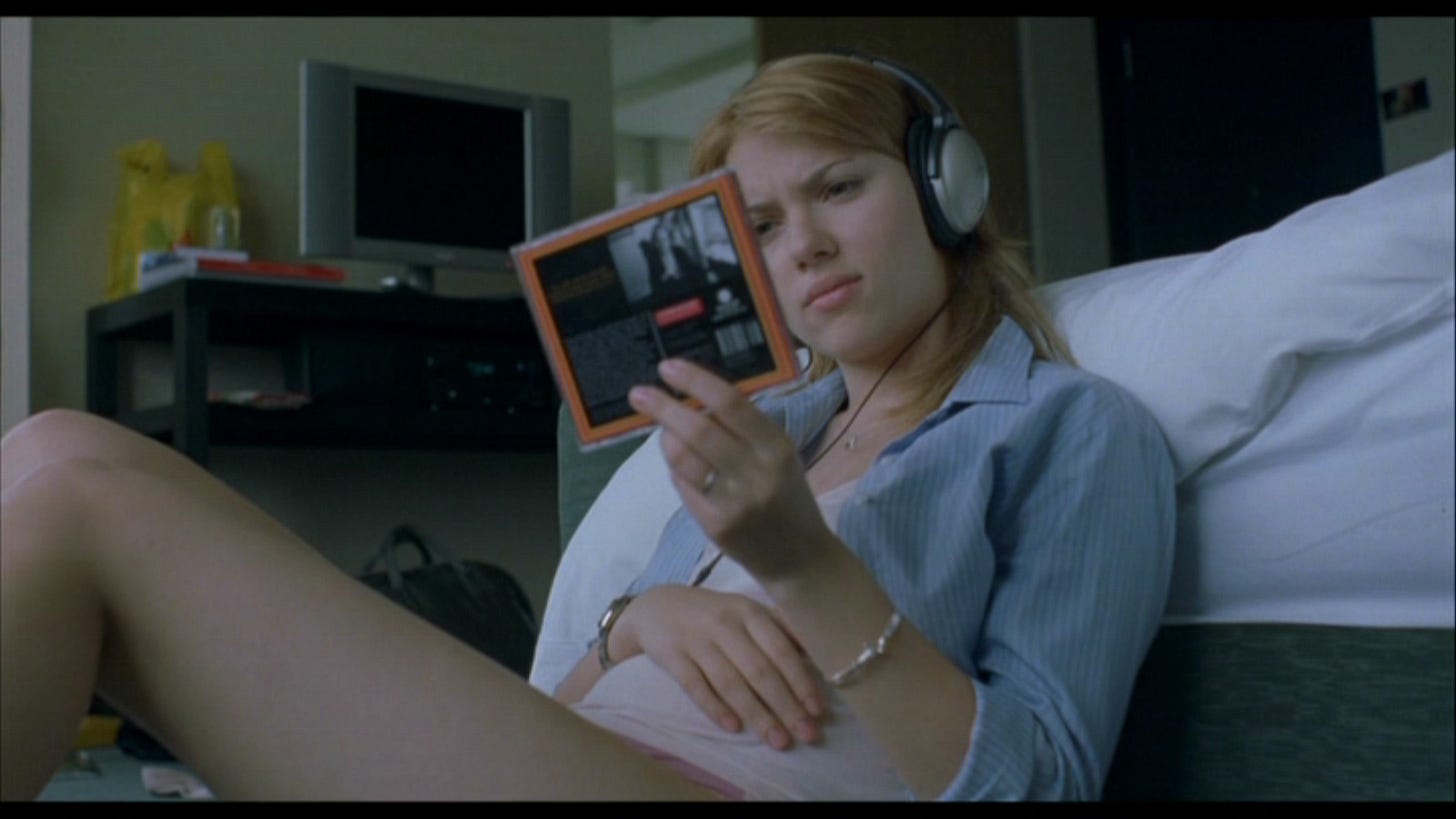---
Archived Post Notice:
This article is preserved here for archival purposes only.
The updated and permanent version now lives at:
https://realityunveiled.com/postscript-lost-in-translation/
Visit the site for the full archive and new essays.
---
Oh, but being alone isn’t what makes you feel lonely. Loneliness is having other people and society and community around you and having a deep sense of being excluded from them. To feel lonely, we need other people. That is to say, it is only in social contexts that a person becomes an individual.1
- Philosopher, The Courage to be Disliked
If you haven’t seen the film Lost in Translation, I suggest watching it soon. But, on the other hand, if you have seen it, it’s worth a re-watch. Although it’s beautifully written and shot by Sofia Coppola as a love story to the megacity of Tokyo, two of the themes that are omnipresent in the film are isolation and loneliness and feeling lost in your direction in life.
Bob Harris, a middle-aged actor, is in Tokyo getting paid $2 million to promote a whisky when he could be doing a play somewhere. Harris is going through a midlife crisis and attempting to find a way to keep his marriage together and stay a part of his children’s lives because he always works. Charlotte is a recently married college graduate that tagged along with her photographer husband to Tokyo to spend more time with him. She’s having an existential crisis, having recently graduated, and not understanding her life’s purpose, wondering if she has one. There’s a great scene where Bob and Charlotte lie on his bed, unable to sleep, discussing life. They both realize they are stuck in their respective lives, unsure of how to reconcile their current struggles:
Charlotte: Does it get easier?
Bob: No… Yes. It gets easier.
Charlotte: Oh yeah? Look at you. [Laughs]
Bob: Thanks. The more you know who you are and what you want, the less you let things upset you.
Charlotte: Yeah. I just don’t know what I’m supposed to be. You know? I tried being a writer, but I hate what I write, and I tried taking pictures, but they’re so mediocre. You know? Every girl goes through a photography phase, you know. Like horses, take dumb pictures of your feet?
Bob: You’ll figure that out. I’m not worried about you. Keep writing.
Charlotte: But I’m so mean.
Bob: Mean’s okay.
Charlotte: What about marriage? Does that get easier?
Bob: That’s hard… We used to have a lot of fun. Lydia would come with me when I made the movies, and we would laugh about it all. Now, she doesn’t want to leave the kids, and she just doesn’t… need me to be there. The kids miss me, but they’re fine. It gets a whole lot more complicated when you have kids.
Charlotte: Yeah. It’s scary.
Bob: It’s the most terrifying day of your life, the day the first one is born.
Charlotte: Yeah. Nobody ever tells you that.
Bob: Your life, as you know it, is gone! Never to return. But they learn how to walk, and they learn how to talk, and you want to be with them. And they turn out to be the most delightful people you will ever meet in your life.2
Charlotte’s loneliness in the film isn’t a sense of isolation from her husband so much as she feels stuck in a lack of direction. The film’s writing alludes to her being married young, graduating from an Ivy League school with a degree in philosophy, and being extremely intelligent. In the above conversation, she relays to Bob that she has tried a couple of different paths (photography; writing) but neither worked out. I’m guessing she married early because of a lack of direction. If she graduated college around age 22 and has already been married for two years, that’s very young for a girl in the west to marry if she doesn’t have a child. Although I’m not a clinically trained psychologist, she feels resentful for her husband, despite loving him deeply, because he’s on his path, and she isn’t.
I understand what Charlotte means when she discusses feeling stuck. I understand her struggle with not finding her path. I even know why she would purchase a self-help CD and later lie to Bob about its ownership. I did not find my path and my “why” until my father’s cancer diagnosis. Perhaps I knew my way, but I was too scared to act. The death of my father and the Pandemic were the catalyst for me to finally figure out who I am and what I want. For this article, however, I want to focus on the themes of loneliness and isolation throughout the film. I’ll save the discussion on marriage for another article. Somehow, the universe brought these two people together in a far-off land, and through serendipity and chance, these two souls find a sense of belonging and spend time together. Although they never express their feelings for each other romantically or sexually (They passionately kiss at the end of the film), you can tell that by being together thousands of miles away from home, all the nonsense of their lives is gone. They can exist together, separately.
Ironically, I have the opposite effect of this film. When I’m at home, I feel more like a homebody. I like to stay in, have home dates, and enjoy my routine. When I travel, that’s the time I want to go and visit and do all of the things. I can’t sit by the pool, read, and tan. Even if my pasty-white skin wanted to play along and tan, sometimes I can’t turn my brain off and “chill.” I become more unencumbered in a new town or foreign country. I want to see exciting and historical places, meet the locals (especially if they’re buxom exotic beauties), and enjoy some local culture. I lose many self-imposed restrictions I unnecessarily place upon myself when home. That being said, I’ve experienced moments of being disjointed, disconnected, and feeling lost when I travel. While I don’t share Bob and Charlotte’s experiences in the film, I know that sense of social isolation and feeling stuck in my life. I understand why the writer/director decided to have both characters at different phases of their lives but still find solace in one another, despite not knowing what happens next. It’s one of my all-time favorite films—I understand how it feels to be lonely or isolated away from family, and being home can also feel directionless.
There have been many great essays and video essays analyzing the themes within the film. However, I urge everyone to watch the movie rather than plagiarize or cite someone else’s analyses. I think it’s one of those films that changes with your mood: When I feel introverted, I vibe with Bob and Charlotte’s loneliness. When I’m feeling romantic, I vibe with the comfort and feelings of “home” in Bob and Charlotte’s companionship. When I’m feeling goofy, I laugh uproariously at the film’s moments of levity (it IS a Bill Murray film, after all). Yet, 20 years later, I still notice little things about the film. As I have said throughout Herd Immunity, I’m a sucker for good writing. Sofia Coppola takes shit for The Godfather: Part III, and rightfully so, but she nailed it with Lost In Translation. Ultimately I choose friendships, companionship, and relationships over physical isolation. I can’t change human nature and accept that the best part of the human experience is in the connections we make. Serendipity, particularly about chance meetings in strange locales, has impacted my life as a writer and intimate relationships. Much like Lost in Translation, sometimes, when I’m miles away from home, I can find “home” in my connections with a new companion. But those are stories for another article or book.
---
Archived Post Notice:
This article is preserved here for archival purposes only.
The updated and permanent version now lives at:
https://realityunveiled.com/postscript-lost-in-translation/
Visit the site for the full archive and new essays.
---
Support Herd Immunity:
Get Herd Immunity: Mental Firmware
Get Herd Immunity: Societal Deprogramming
Kishimi, Ichirō, and Fumitake Koga. 2017. The Courage to Be Disliked: The Japanese Phenomenon That Shows You How to Change Your Life and Achieve Real Happiness. New York; London; Toronto: Atria Books, 52
Coppola, Sofia, director. 2003. Lost in Translation. Universal Studios, 2010. Blu-Ray Disc, 1080p HD.





